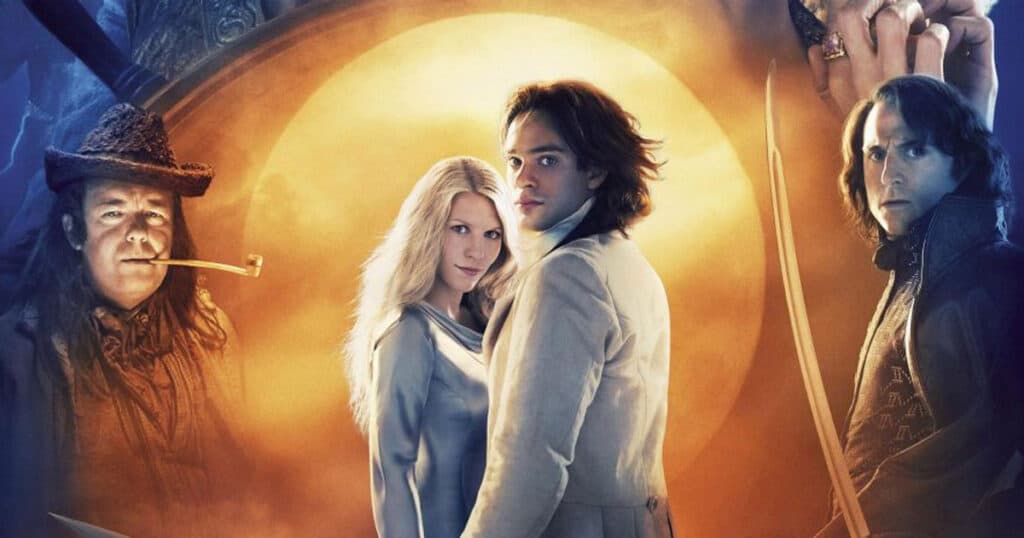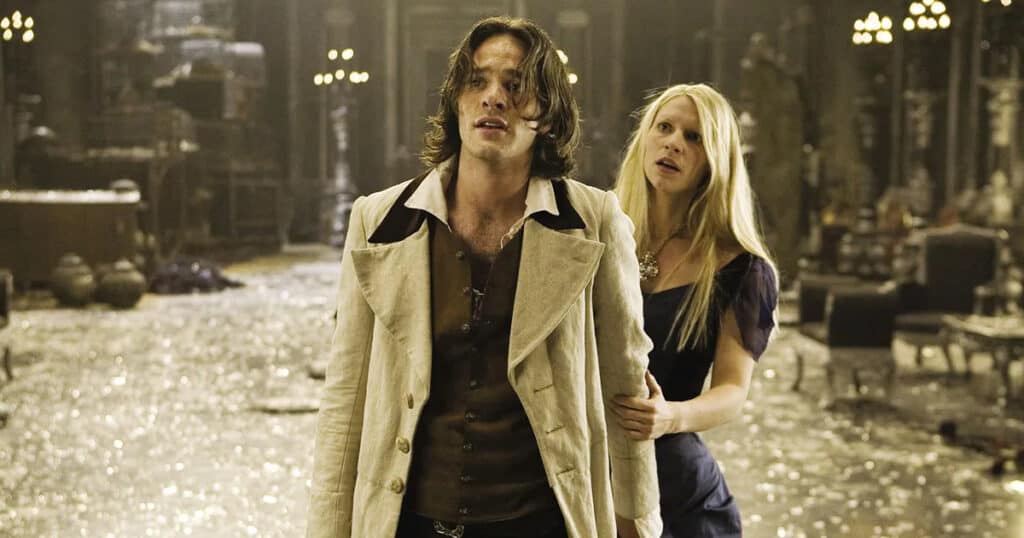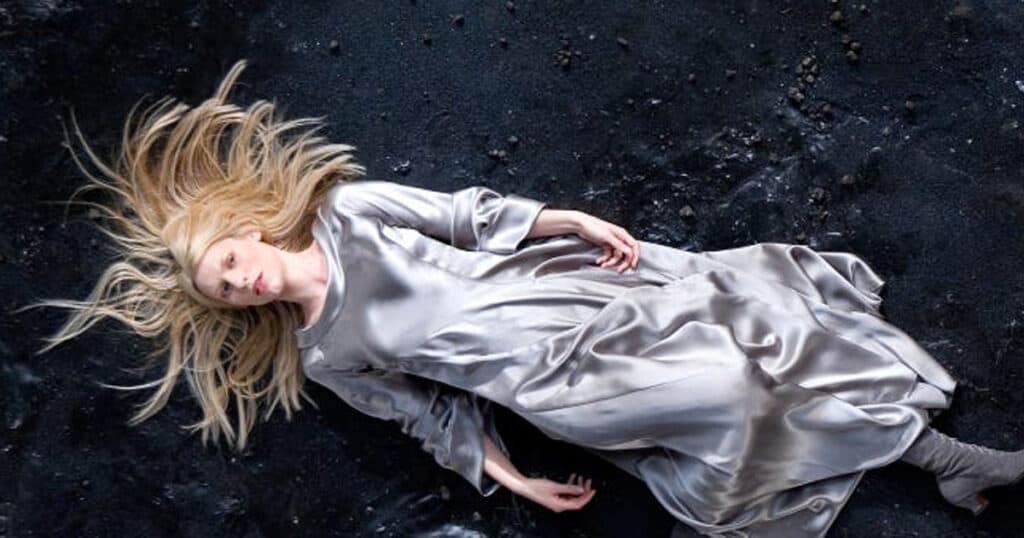Last Updated on August 30, 2024
Director Matthew Vaughn is known for making gangster movies and comic book adaptations. Producing Lock, Stock, and Two Smoking Barrels and making his directorial debut with Layer Cake paved the way for bigger projects: Kick-Ass, X-Men: First Class, the Kingsman franchise, Argylle. But in between the gangsters and the over-the-top heroics, he decided to make a fairy tale. Based on the writing of popular author Neil Gaiman, the film tells of witches, unicorns, flying ships, lightning catchers, and a falling star… that’s actually a person. Released in 2007, the movie we’re talking about is called Stardust. And it’s time for it to be Revisited.
The story of Stardust goes back to the early 1990s. While out driving one day, Neil Gaiman saw a wall running along one side of the road and was struck by the idea that a magical kingdom called Faerie might exist on the other side of that wall. So he started plotting a book that he intended to call Wall, which would have been about a writer from America moving to England, where he discovers this wall that separates the world we see around us from the land of Faerie. This idea was set aside when Gaiman saw a shooting star cross the sky one night. In that moment, he was inspired to write a whole different story about Faerie and the wall.
With illustrator Charles Vess, Gaiman crafted a text-heavy four-issue comic book mini-series called Stardust. The story begins in 1839, in the English town of Wall. Every nine years, on May Day, the magical beings that inhabit Faerie hold a market event in the meadow outside the town. The rest of the time, the gap in the wall between the two lands is under twenty-four hour guard. When a Wall resident named Dunstan Thorn crosses over into Faerie, he ends up being enchanted by a young woman named Una. She is kept as a slave by a witch-woman called Ditchwater Sal, who makes Una spend most of her time as a bird. But she’s in her proper form when she meets Dunstan. They have sex and Dunstan returns to Wall… where, nine months later, a baby is delivered to his door. Turns out he and Una have had a son. Dunstan raises this son, named Tristran. Eighteen years later, Tristran has become infatuated with fellow Wall resident Victoria Forester. He gets her to go out with him one night, but she won’t give him a kiss. When they see a falling star, Victoria tells Tristran she’ll give him anything he desires if he retrieves the fallen star for her. So Tristran sets out to find the star, crossing over into the land of Faerie. And going on a much bigger adventure than he anticipated.
Turns out, the star that has fallen to the ground is a person. Or at least she has a humanoid appearance. Her name is Yvaine, and she was knocked out of the sky when she was hit by a topaz pendant, which was tossed into the sky by the dying Lord of a land called Stormhold. The Lord once had seven sons, but they’ve been killing each other off to get closer to the throne. The dead ones are still hanging around as ghosts. A few sons are left alive, and whoever finds the topaz pendant – now in the possession of Yvaine – will replace their father on the throne. Meanwhile, a trio of decrepit witches have also seen the star fall from the sky. One of them goes to find where it has landed… because if they cut out Yvaine’s heart and consume it, their youth and beauty will be restored. The witch uses magic to cover up her true appearance, but every time she uses other spells on her journey, her real looks start to come through.

Tristran is the first to reach Yvaine. Even though he’s surprised to see that the star is a woman rather than a rock, he still goes through with taking her back to Wall. And thus has to deal with witches and the sons of Stormhold coming after her. Along the way, there are encounters with a unicorn, goats that have been transformed into people, and the crew of a ship that flies above the clouds, on a lightning-hunting expedition.
A couple years after the Stardust comic book was published, Gaiman also released the story as a novel without Vess’s illustrations. But even before that, Miramax had picked up the film rights to Stardust. They had Gaiman write a treatment for the adaptation, but they didn’t like what he wrote. So they had Ehren Kruger write another treatment. Which they didn’t like, either. So they lost interest and Gaiman got the rights back. Disappointed with the Miramax experience, he spent the next few years rejecting people and companies that wanted to make a Stardust movie. Then, in 2003, he made a short film called A Short Film About John Bolton, which was produced by Matthew Vaughn. They had a good time working together – and around this time, Vaughn’s wife Claudia Schiffer read and fell in love with Stardust. So Gaiman felt comfortable moving forward with a Stardust adaptation that would have Vaughn involved. At first, Vaughn was going to produce the film and Terry Gilliam was going to direct it. But then Gilliam made the 2005 fantasy film The Brothers Grimm, which centers on the legendary fairy tale tellers and sends them on their own fairy tale adventure. After making that movie, Gilliam said there was no way he could go right back into the world of fairy tales. So he dropped out of Stardust. In the meantime, Vaughn had gotten into directing when Guy Ritchie decided not to make Layer Cake. On the strength of that film, 20th Century Fox hired him to direct X-Men: The Last Stand. Two weeks before that movie was going to start filming, he stepped away due to creative disagreements with the studio. That’s when Vaughn decided he was going to direct Stardust himself.
At Gaiman’s suggestion, Vaughn brought Jane Goldman in to write the screenplay with him, establishing a partnership that would continue through several more of Vaughn’s films. Whittling Gaiman’s story down into a two hour film presented multiple challenges. They had to simplify portions of the story, which included having to remove a really fun character known as “the little hairy man” so they could get Tristran to Yvaine quicker. They also changed Tristran’s name to Tristan and called the magical land Stormhold instead of Faerie. They expanded some elements of the story: for example, Gaiman didn’t write much about Tristan and Yvaine’s time on the flying ship. Vaughn and Goldman put a lot more focus on that, turning Captain Alberic into Captain Shakespeare, a gay man who puts on drag shows in private, then puts on a macho act in front of his crew. The screenwriters also had to figure out how rough-edged the film should be. Gaiman’s story has been described as a fairy tale for grown-ups. Most of the text is quite family friendly, but then there’s the sex scene between Dunstan and Una in the first chapter, another sex scene involving a prostitute later, an F-bomb, a throat slitting, and a unicorn’s head being hacked off with a meat cleaver. Vaughn and Goldman chose to soften the edges, keeping things family-friendly throughout. And while Gaiman’s story has a rather low-key resolution, for a movie they had to keep things action-packed.

Seeking an unknown to play Tristan, Vaughn chose Charlie Cox. Who, these days, is best known for being Marvel’s Daredevil. Bigger names were cast around Cox. Claire Danes plays Yvaine (although Bryce Dallas Howard was Vaughn’s original choice), Michelle Pfeiffer is the witch Lamia, some of the sons of Stormhold are played by Mark Strong, Jason Flemyng, and Rupert Everett. Their father is played by the great Peter O’Toole. Robert De Niro took on the role of Captain Shakespeare. Ricky Gervais plays Ferdy the Fence, a character who was created for the film. Sienna Miller is Tristan’s crush Victoria, while Henry Cavill has a small role as a rival for her affections. Ian McKellen provides the narration. Tristan’s parents Dunstan and Una are played by Ben Barnes and Kate Magowan, with Nathaniel Parker as the older Dunstan.
Vaughn and Goldman changed a lot about Stardust on the way from the page to the screen. Reading the book and watching the movie are very different experiences. This could cause some disappointment for those who decide to check out both. If you watch the movie first, you may be let down when you find that Captain Shakespeare is nowhere to be found or that the climactic action isn’t there. If you read the book first, the way things are presented in the movie may not live up to the magical world you imagined. Where’s the little hairy man? The vampire trees? The talking badger in a dressing gown? The fight between the lion and the unicorn? Some of the changes were budgetary. It was going to be way too expensive for Vaughn to put a lion and unicorn battle on screen. Some were creative. He wanted to spend more time on the flying ship, build in a lesson that you shouldn’t pretend to be something you’re not just to impress others, work in some entertaining action, and present this fairy tale in a more down-to-earth way. Even with the witch’s magic, he didn’t want it to be too outlandish. His approach was to make something that would feel like a blend of The Princess Bride and Midnight Run.
Gaiman acknowledges that the movie is different from what he wrote and he wasn’t sure about some of the changes that were being made. But in the end, he seemed pleased with and accepting of the film. As he told USA Today, it’s better that Vaughn didn’t try to exactly replicate what was on the page, because, “I would hate for people to go and see a version of Stardust that is Stardust the book, only not as good.” He went on to tell Empire, “I sort of feel like my grounding in comics was actually very useful because in my head, that’s just the Earth-Two version of Stardust. It’s a parallel Earth version of Stardust, which has Robert De Niro and stuff.”
So taking Stardust the movie on its own terms, it’s an entertaining fantasy film. Vaughn was admittedly better at shooting action and keeping things moving along quickly than he was with the human relationship stuff. Stardust may still be over two hours long, but it moves through those two hours at a fast pace. Some of this is due to the way the script condensed the original story, but it’s also due to the fact that Vaughn is always bouncing back and forth between the various characters, never giving any of them scenes that are too drawn out. There’s so much bouncing around, the witch Lamia and Septimus of Stormhold almost start to overshadow Tristan and Yvaine in a story that’s meant to revolve around them. But that’s where Goldman steps in. Gaiman suggested having her co-write the script with Vaughn because she could help him with the relationship side of things, and there are some sweet moments with Tristan and Yvaine as we watch them gradually fall in love.

Sure, the livelier and occasionally over-the-top performances from the supporting cast do steal the show. But Charlie Cox and Claire Danes are able to keep their section of the story grounded.
The climactic action sequence Vaughn and Goldman came up with feels absolutely right for their telling of the story. It wraps things up in a fun way, and even if you’re hung up on the fact that it’s so different from the book… how could you ever complain about a sequence that lets you watch a swordfight where one of the participants is a corpse that a witch is using like a puppet?
Test audiences were so pleased with Stardust, producer Lorenzo di Bonaventura was even surprised at how highly they scored it. He told Rotten Tomatoes, “It’s a weird thing to say. I don’t think everybody’s going to love the movie because it’s not a movie that’s designed to be that. And yet, when we went and tested it, they really flipped for it. It just caught me off guard. It was a movie where I expected to have a larger portion of the audience sort of go, ‘Well, that’s sort of out there. Not sure it’s for us.’ And what happened was that we delivered a romance so spectacularly well, Matthew Vaughn did such a good job with it, that it caught a segment of the audience that I wasn’t expecting.” The test audiences did bring up an issue on how the movie should be marketed, because they strongly disagreed that it should be described as a fairy tale. So di Bonaventura wasn’t sure what they should call it. As he said, “It is an adventure movie, it is a romance, it is fantasy, it is Neil Gaiman’s bizarre world view.”
Whatever it is, it had a budget somewhere in the range of seventy to ninety million dollars, so it needed to do well. Paramount Pictures gave it a wide release in the United States in the summer of 2007… and it opened at number four. Its opening weekend was described as a crash-landing and Stardust was compared to the fantasy films that flopped in the 1980s. Still, the U.S. ended up being the film’s largest market, as it made a total of thirty-eight million there. The U.K. release followed a few months later and added thirty-one million to Stardust’s haul. It ended up with a total of one hundred and thirty-seven million at the global box office. Not a big success, but not a bomb, either. The film was well-received by critics and the audiences that did show up to see it. It gathered a cult following… and that following grew when it reached home video, where it was more successful than it was in theatres.
That wasn’t enough to get a sequel greenlit, though. Seven years after the movie was released, Vaughn revealed to Den of Geek that he had really been hoping to get the chance to make a follow-up. He said, “I had a really crazy fun idea for a Stardust 2. The opening scene was Charlie Cox’s character being the King and throwing out the necklace. This time the necklace goes over the wall and bounces off Big Ben, and you’re suddenly in London in the early 1960s, with these mad kings and princes and princesses running around London. All on the quest for the stone. That was my idea for the sequel, but sadly the film didn’t make enough money for anyone to want to make it.”
It’s a shame that Vaughn didn’t get to make his return to the world of Stardust, but at least he got to make one trip to that world, and delivered a film that has been loved by many of its viewers. If you haven’t seen it yet, it’s worth checking out, as it still holds up all these years later. And where else are you going to see a swordfighting corpse being puppeteered by a witch?


















Follow the JOBLO MOVIE NETWORK
Follow us on YOUTUBE
Follow ARROW IN THE HEAD
Follow AITH on YOUTUBE